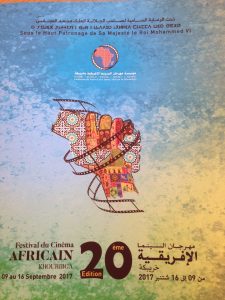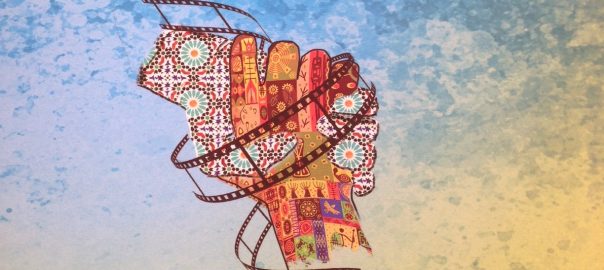This year marked the 20th edition of the African Cinema Festival in Khourigba (9-16 Sept 2017), which was created in the Spring of 1977 by the Federation of Cine-Clubs in Morocco, and largely supported by the OCP (Organisation Chérifienne des Phosphates) – to be expected in the capital of phosphates. Khouribga, a city two hours away from Casablanca, is off the beaten track, with an economy completely driven by the OCP, as attested by an exhibit of photographs next to the Cultural Center where the films are screened.

Presided over by Nour Eddine Saïl, this festival welcomes films from all over the African continent. In his editorial introduction to the richly illustrated festival catalogue, Saïl reminds us that the festival was founded in coordination with the Cahiers du Cinéma magazine, and was the result of “the serene encounter between the intense absorbing power of Khouribga and the intense emissive power of the still very young African Cinema at that time.”
The range of countries represented by the films in competition is impressive: Algeria, Benin, Burkina-Faso, Egypt, Ghana, Morocco, Mozambique, Rwanda (also the honored cinema of the festival), Senegal, South Africa, Togo, Tunisia, Uganda…
And yet the fate of African cinema is still precarious, as Saïl soberly reminds us in the same introduction, comparing it at times to the rock, painfully, endlessly pushed up the hill by Sisyphus:
“On a continental scale, the quantity of films produced each year is rather insignificant, as is the case when it comes to the number of cinemas and screens. The same applies to public policies regarding our national film industries: policies that lack overall vision, continuity, and real determination; all served with cheerfully irresponsible verbosity.”
This year, the festival also organized a colloquium centered on “immigration and cultural integration” and the image of the Sub-Saharan migrant. The organisers of the colloquium partnered up with the Délégation Générale de l’Administration Pénitentiaire et de la Réinsertion and took the festival delegation to the prison of Khouribga for two consecutive days, sharing two film screenings and discussions (Horizon Beautiful, Stefan Jäger, Ethiopia, 2013, and A Mile in My Shoes, Saïd Khallaf, Morocco, 2016). The prisoners (men and women) in attendance were mostly Sub-Saharan migrants who had been brought in from various prisons throughout the Kingdom. One of the most moving pleas during the discussion came from an eloquent young man who asked of the film people he was facing that they use the media to help change (Moroccan) stereotypes on Sub-Saharan African migrants (e.g. that they are empty-headed victims fleeing war-torn countries) and to help construct and broadcast representations of the migrant population closer to reality: educated individuals trying to make a better, dignified living.
Florence Martin
